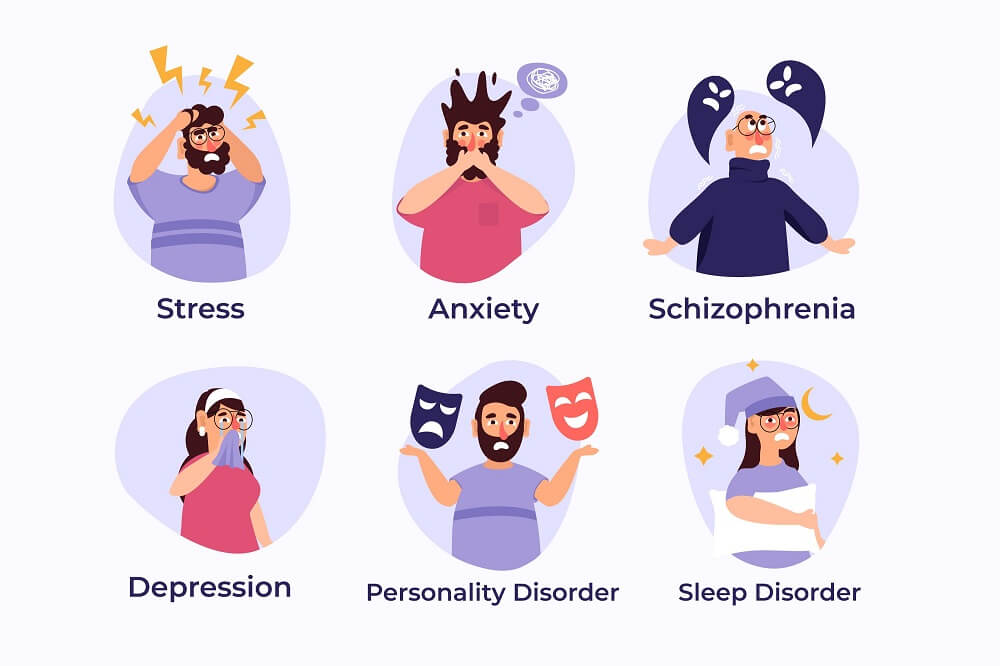BPD (borderline personality disorder) is a rare mental health condition that affects around one to two percent of the population. It generally starts in adulthood but can occasionally occur in late adolescence which can be serious, as hormones and emotions are often more volatile in young adults, it cannot be diagnosed until the age of eighteen. Personality disorders are chronic conditions that involve dysfunctional behaviours that are inflexible and can negatively affect their relationships with other people and cause them distress in social situations.
BPD can cause a wide range of symptoms but these can be broadly grouped into four main categories:
- Emotional instability
- Disturbed patterns of thinking
- Impulsive behaviours
- Unstable relationships
The condition affects the way a person thinks about themselves and other people and can make everyday life challenging. They suffer from extreme mood swings and have great difficulty in controlling their emotions. It causes them to have an unhealthy view of themselves, problems with impulse control and erratic behaviour which can lead to self-destructive behaviours and intense and unstable relationships.
People with BPD have an intense fear of abandonment and even though they want to be loved and be in a stable relationship they struggle with anger issues and mood changes. They can be very sensitive and have problems with self-image and all of these things can make it hard to maintain healthy relationships. Often people who have BPD don’t realise they have the condition as they are unaware that there are healthier ways to relate to other people.
Whilst BPD is similar to bipolar disorder because it also involves mood swings, it differs because bipolar is less reactive and the moods are more sustained. Also unlike bipolar BPD does not alter a person’s activity and energy levels.
Causes and Risks
As with many mental health conditions there is no known single cause for the development of BPD. However experts believe that a combination of contributary factors can lead to its development and these can include one or more of the following:
Genetics
There is some evidence that BPD can run in families so inherited genes can make you more likely to develop the condition.
Brain Changes or Structure
Research has shown that there are certain changes in the part of the brain that deals with emotions in people with BPD also altered serotonin levels can cause aggression and impulse control.
Trauma
Traumatic childhood experiences like neglect, physical, emotional or sexual abuse it’s believed as many as seventy percent of people with BPD have been affected by childhood abuse.
Family History
A history of alcohol or drug abuse within the family or family member who have bipolar as well as poor maternal attachment or separation.
If BPD remains undiagnosed it can lead to the risk of developing other mental health conditions that can include:
- Anxiety disorders
- Attention-deficit hyperactivity disorder
- Bipolar disorder
- Depression
- Eating disorders
- Mood disorders
- Post-traumatic stress disorder
- Substance abuse disorders
- Symptoms
Symptoms of BPD can vary amongst individuals in severity and duration, and as they get older the impulsiveness, mood swings, and anger can improve. Symptoms like fear of abandonment and self-image as well as problems with relationships will continue.
Psychological Symptoms
BPD causes a range of intense and often negative emotions which can include:
- Anger or rage.
- Intense feelings of hatred or love.
- Sorrow, fear, panic or terror.
- Having a distorted and unstable self-image believing themselves to be a bad person or as if they don’t exist.
- Sadness, shame, guilt, despair and long-term feelings of loneliness or emptiness.
- Anxiety, depression or paranoia.
Behavioural Symptoms
Because people with BPD have such an extreme fear of abandonment and are unable to control their extreme and intense emotions it can cause them to:
- Suffer from mood swings that can last for hours whilst changing both frequently and rapidly which causes changes in how they perceive themselves and others.
- Have problems maintaining relationships because they can be clingy or needy, but because they doubt their feelings and fear abandonment they can also push people away as they fear rejection.
- Are prone to negative feelings like bitterness, sarcasm, anger or aggression then feel shame or guilt after displaying these behaviours.
- Impulsive behaviours including self-harm or suicide attempts or engaging in reckless behaviour like having unsafe sex, drug or alcohol misuse, gambling or binge eating or spending sprees.
- Have periods of paranoia, usually stress related where they can lose the ability to know what is real and what is not which can leave them feeling dissociated from their body.
- Have problems trusting people because they have an irrational fear of other peoples intentions.

Professional Help
If you are showing any of the above symptoms or behaviours you should consult your doctor. They can rule out any undiagnosed physical health condition that could be causing them. They may prescribe medication to help you if you are struggling with anxiety or depression, such as antianxiety or antidepressant medication. This can be used in conjunction with therapy which is the main treatment for BPD.
Your therapist can decide what therapy will be most beneficial for you to best meet you specific needs.This can include a single or combination of therapies which most commonly includes:
CBT (Cognitive Behavioural Therapy)
Is a form of talking therapy that helps you to recognise and change unhealthy or negative thoughts and behaviours. It can help you to acknowledge inaccurate perceptions of yourself and other people, and to work through relationship difficulties, reduce anxiety and mood swings and make you less likely to self-harm or have suicidal thoughts.
DBT (Dialectical Behavioural Therapy)
Developed specifically for people with borderline personality disorder it focuses on helping you be aware and accept your life and behaviours. It also helps you to learn how to change your life and unhelpful behaviours as well as to manage your emotions. This will help you with your relationships and to reduce self-destructive habits.

Group Therapy
Can help you to interact with other people with similar challenges, and improve social interactions and develop communication skills and be better able to express yourself under the supervision of a therapist.
Schema-Focused Therapy
This form of therapy focuses on changing negative thought patterns ad helps you to vie yourself and those around you in a more positive way. Written by Jan, Jeana and Wendy at Barnsley Hypnosis and Counselling (UK). For more free information click above link.

